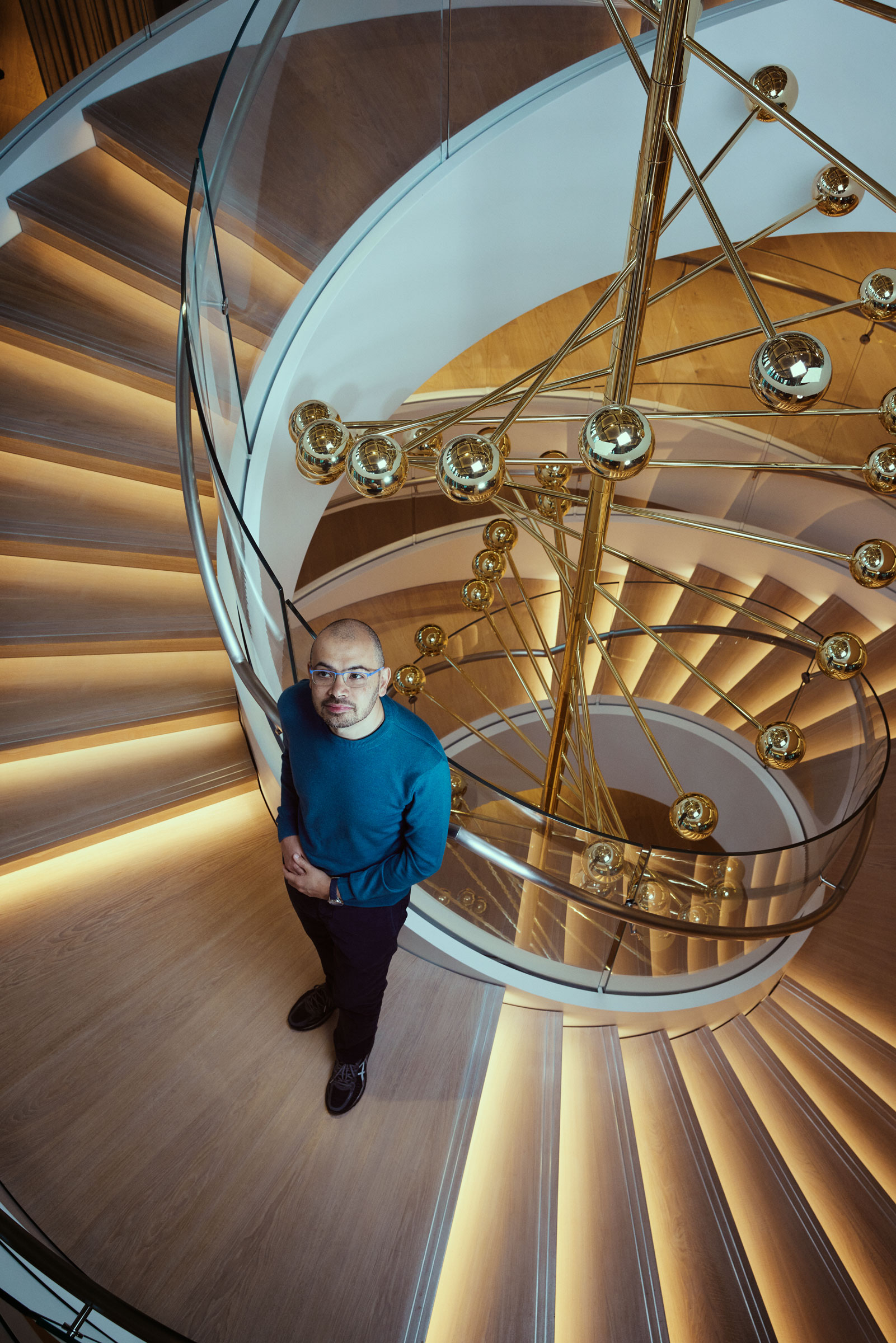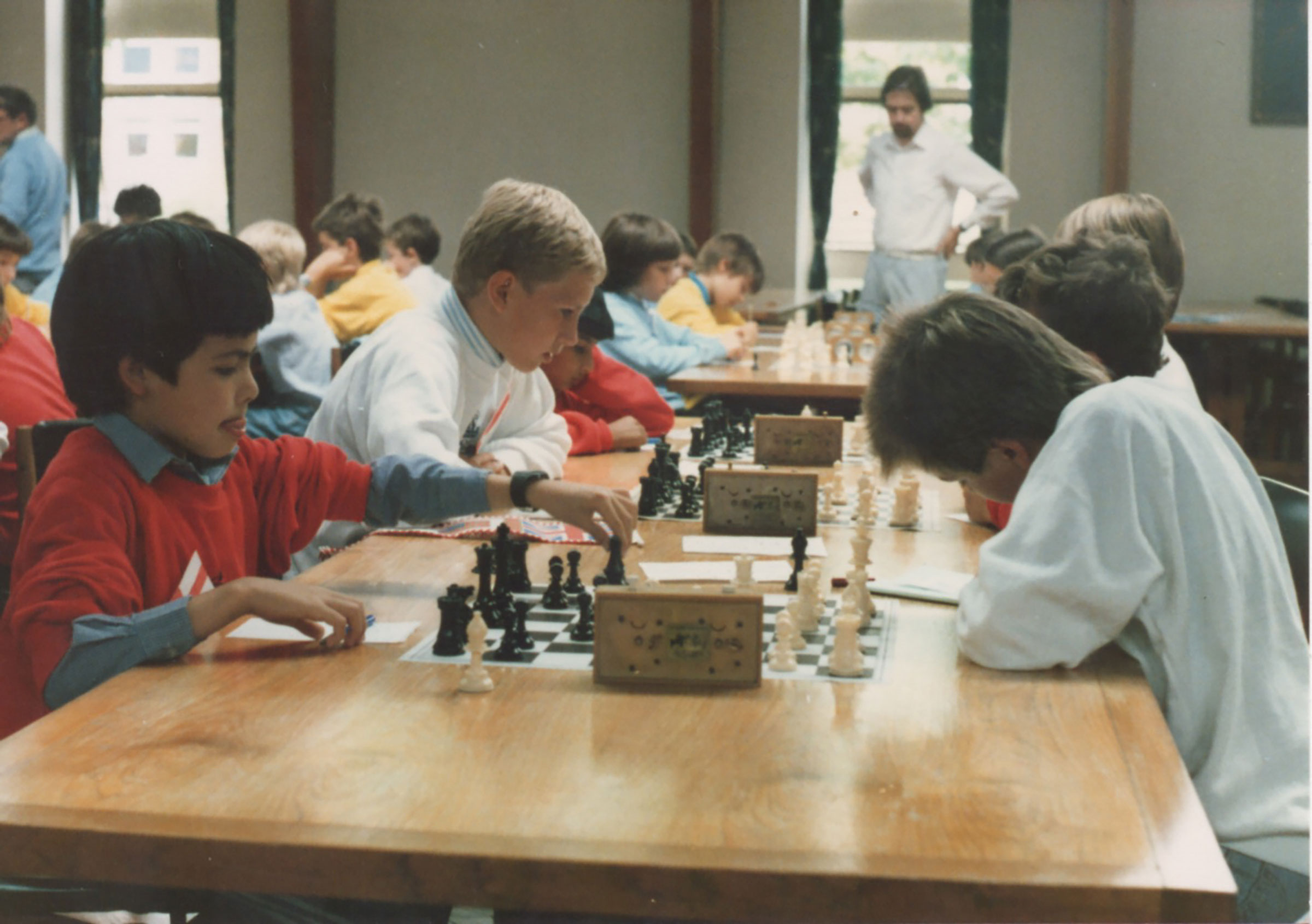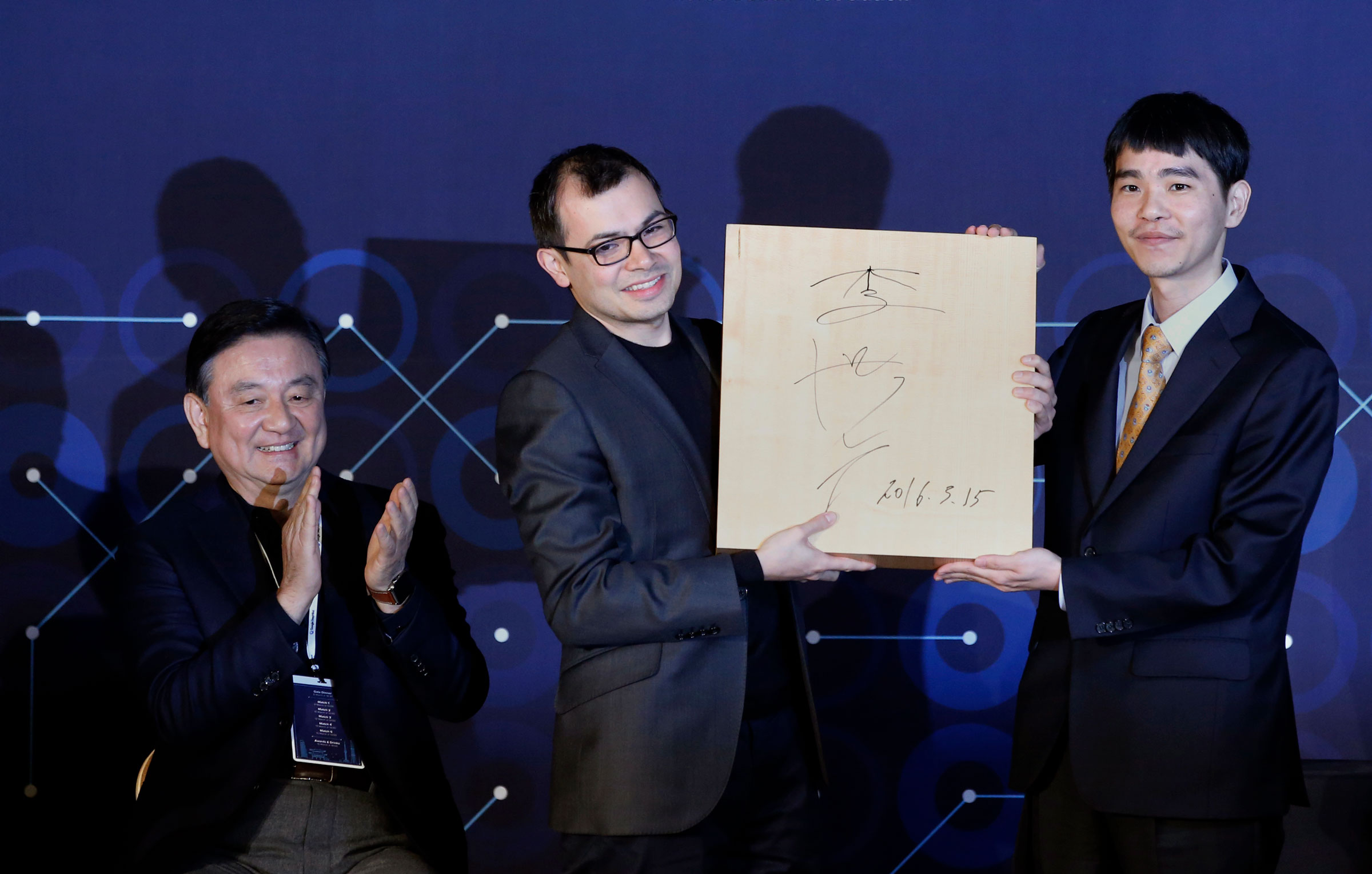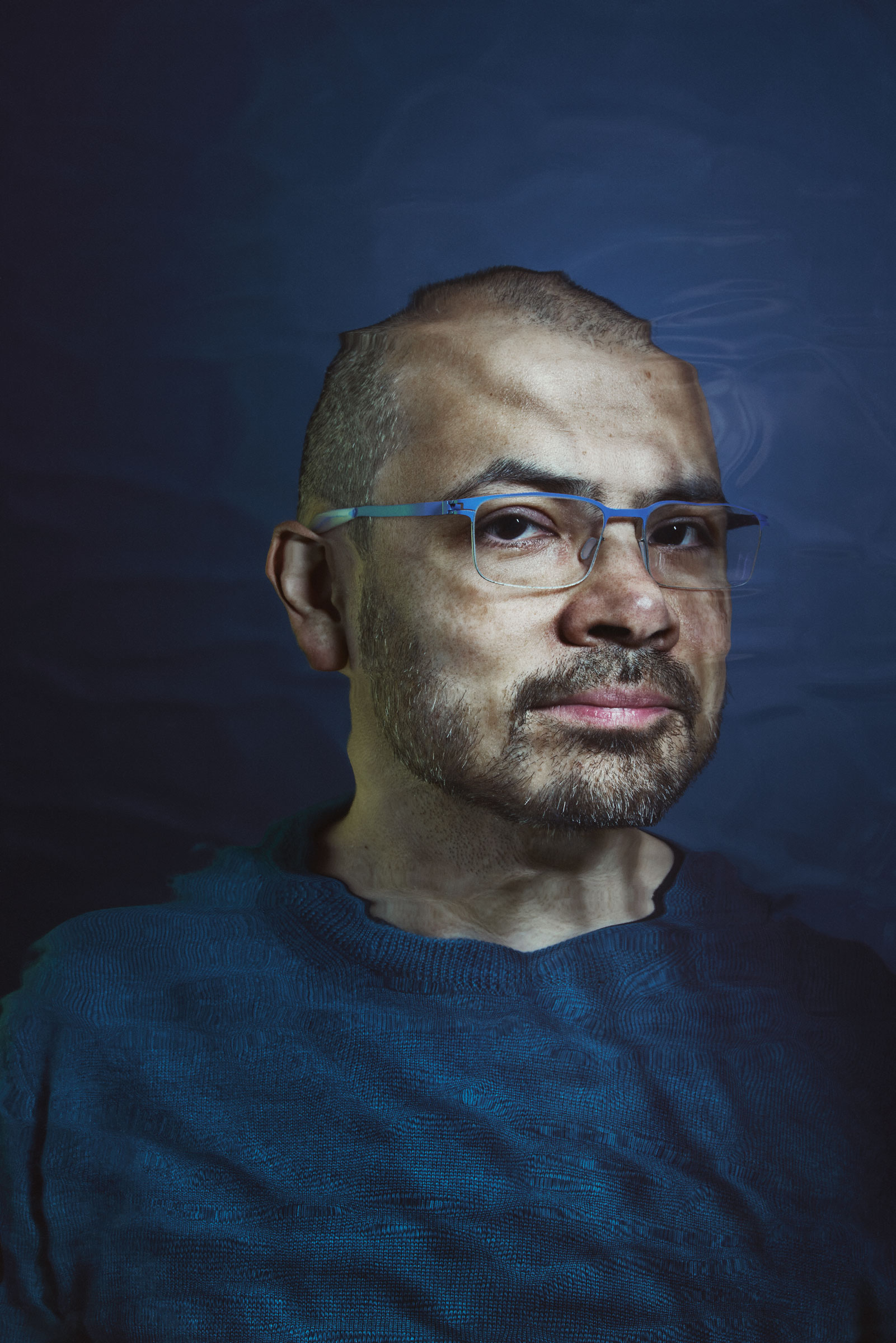
Demis Hassabis stands halfway up a spiral staircase, surveying the cathedral he built. Behind him, light glints off the rungs of a golden helix rising up through the staircase’s airy well. The DNA sculpture, spanning three floors, is the centerpiece of DeepMind’s recently opened London headquarters. It’s an artistic representation of the code embedded in the nucleus of nearly every cell in the human body. “Although we work on making machines smart, we wanted to keep humanity at the center of what we’re doing here,” Hassabis, DeepMind’s CEO and co-founder, tells TIME. This building, he says, is a “cathedral to knowledge.” Each meeting room is named after a famous scientist or philosopher; we meet in the one dedicated to James Clerk Maxwell, the man who first theorized electromagnetic radiation. “I’ve always thought of DeepMind as an ode to intelligence,” Hassabis says.
Hassabis, 46, has always been obsessed with intelligence: what it is, the possibilities it unlocks, and how to acquire more of it. He was the second-best chess player in the world for his age when he was 12, and he graduated from high school a year early. As an adult he strikes a somewhat diminutive figure, but his intellectual presence fills the room. “I want to understand the big questions, the really big ones that you normally go into philosophy or physics if you’re interested in,” he says. “I thought building AI would be the fastest route to answer some of those questions.”
DeepMind—a subsidiary of Google’s parent company, Alphabet—is one of the world’s leading artificial intelligence labs. Last summer it announced that one of its algorithms, AlphaFold, had predicted the 3D structures of nearly all the proteins known to humanity, and that the company was making the technology behind it freely available. Scientists had long been familiar with the sequences of amino acids that make up proteins, the building blocks of life, but had never cracked how they fold up into the complex 3D shapes so crucial to their behavior in the human body. AlphaFold has already been a force multiplier for hundreds of thousands of scientists working on efforts such as developing malaria vaccines, fighting antibiotic resistance, and tackling plastic pollution, the company says. Now DeepMind is applying similar machine-learning techniques to the puzzle of nuclear fusion, hoping it helps yield an abundant source of cheap, zero-carbon energy that could wean the global economy off fossil fuels at a critical juncture in the climate crisis.
Hassabis says these efforts are just the beginning. He and his colleagues have been working toward a much grander ambition: creating artificial general intelligence, or AGI, by building machines that can think, learn, and be set to solve humanity’s toughest problems. Today’s AI is narrow, brittle, and often not very intelligent at all. But AGI, Hassabis believes, will be an “epoch-defining” technology—like the harnessing of electricity—that will change the very fabric of human life. If he’s right, it could earn him a place in history that would relegate the namesakes of his meeting rooms to mere footnotes.
But with AI’s promise also comes peril. In recent months, researchers building an AI system to design new drugs revealed that their tool could be easily repurposed to make deadly new chemicals. A separate AI model trained to spew out toxic hate speech went viral, exemplifying the risk to vulnerable communities online. And inside AI labs around the world, policy experts were grappling with near-term questions like what to do when an AI has the potential to be commandeered by rogue states to mount widespread hacking campaigns or infer state-level nuclear secrets. In December 2022, ChatGPT, a chatbot designed by DeepMind’s rival OpenAI, went viral for its seeming ability to write almost like a human—but faced criticism for its susceptibility to racism and misinformation. So did the tiny company Prisma Labs, for its Lensa app’s AI-enhanced selfies. But many users complained Lensa sexualized their images, revealing biases in its training data. What was once a field of a few deep-pocketed tech companies is becoming increasingly accessible. As computing power becomes cheaper and AI techniques become better known, you no longer need a high-walled cathedral to perform cutting-edge research.
Read More: The Price of Your AI-Generated Selfie
It is in this uncertain climate that Hassabis agrees to a rare interview, to issue a stark warning about his growing concerns. “I would advocate not moving fast and breaking things,” he says, referring to an old Facebook motto that encouraged engineers to release their technologies into the world first and fix any problems that arose later. The phrase has since become synonymous with disruption. That culture, subsequently emulated by a generation of startups, helped Facebook rocket to 3 billion users. But it also left the company entirely unprepared when disinformation, hate speech, and even incitement to genocide began appearing on its platform. Hassabis sees a similarly worrying trend developing with AI. He says AI is now “on the cusp” of being able to make tools that could be deeply damaging to human civilization, and urges his competitors to proceed with more caution than before. “When it comes to very powerful technologies—and obviously AI is going to be one of the most powerful ever—we need to be careful,” he says. “Not everybody is thinking about those things. It’s like experimentalists, many of whom don’t realize they’re holding dangerous material.” Worse still, Hassabis points out, we are the guinea pigs.
Hassabis was just 15 when he walked into the Bullfrog video-game studios in Guildford, in the rolling green hills just southwest of London. As a child he had always been obsessed with games. Not just chess—the main source of his expanding trophy cabinet—but the kinds you could play on early computers, too. Now he wanted to help make them. He had entered a competition in a video-game magazine to win an internship at the prestigious studio. His program—a Space Invaders-style game where players shot at chess pieces descending from the top of the screen—came in second place. He had to settle for a week’s work experience.

Peter Molyneux, Bullfrog’s co-founder, still remembers first seeing Hassabis. “He looked like an elf from Lord of the Rings,” Molyneux says. “This little slender kid came in, who you would probably just walk past in the street and not even notice. But there was a sparkle in his eyes: the sparkle of intelligence.” In a chance conversation on the bus to Bullfrog’s Christmas party, the teenager captivated Molyneux. “The whole of the journey there, and the whole of the journey back, was the most intellectually stimulating conversation,” he recalls. They talked about the philosophy of games, what it is about the human psyche that makes winning so appealing, and whether you could imbue those same traits in a machine. “All the time I’m thinking, This is just a kid!” He knew then this young man was destined for great things.
The pair became fast friends. Hassabis returned to Bullfrog in the summer before he left for the University of Cambridge, and spent much of that time with Molyneux playing board and computer games. Molyneux recalls a fierce competitive streak. “I beat him at almost all the computer games, especially the strategy games,” Molyneux says. “He is an incredibly competitive person.” But Molyneux’s bragging rights were short-lived. Together, in pursuit of interesting game dynamics that might be the seed of the next hit video game, they invented a card-game they called Dummy. Hassabis beat Molyneux 35 times in a row.
After graduating from Cambridge, Hassabis returned to Bullfrog to help Molyneux build his most popular game to date: Theme Park, a simulation game giving the player a God’s-eye view of an expanding fairground business. Hassabis went on to establish his own game company before later deciding to study for a Ph.D. in neuroscience. He wanted to understand the algorithmic level of the brain: not the interactions between microscopic neurons but the larger architectures that seemed to give rise to humanity’s powerful intelligence. “The mind is the most intriguing object in the universe,” Hassabis says. He was trying to understand how it worked in preparation for his life’s quest. “Without understanding that I had in mind AI the whole time, it looks like a random path,” Hassabis says of his career trajectory: chess, video games, neuroscience. “But I used every single scrap of that experience.”
By 2013, when DeepMind was three years old, Google came knocking. A team of Google executives flew to London in a private jet, and Hassabis wowed them by showing them a prototype AI his team had taught to play the computer game Breakout. DeepMind’s signature technique behind the algorithm, reinforcement learning, was something Google wasn’t doing at the time. It was inspired by how the human brain learns, an understanding Hassabis had developed during his time as a neuroscientist. The AI would play the game millions of times, and was rewarded every time it scored some points. Through a process of points-based reinforcement, it would learn the optimum strategy. Hassabis and his colleagues fervently believed in training AI in game environments, and the dividends of the approach impressed the Google executives. “I loved them immediately,” says Alan Eustace, a former senior vice president at Google who led the scouting trip.
Hassabis’ focus on the dangers of AI was evident from his first conversation with Eustace. “He was thoughtful enough to understand that the technology had long-term societal implications, and he wanted to understand those before the technology was invented, not after the technology was deployed,” Eustace says. “It’s like chess. What’s the endgame? How is it going to develop, not just two steps ahead, but 20 steps ahead?”
Eustace assured Hassabis that Google shared those concerns, and that DeepMind’s interests were aligned with its own. Google’s mission, Eustace said, was to index all of humanity’s knowledge, make it accessible, and ultimately raise the IQ of the world. “I think that resonated,” he says. The following year, Google acquired DeepMind for some $500 million. Hassabis turned down a bigger offer from Facebook. One reason, he says, was that, unlike Facebook, Google was “very happy to accept” DeepMind’s ethical red lines “as part of the acquisition.” (There were reports at the time that Google agreed to set up an independent ethics board to ensure these lines were not crossed.) The founders of the fledgling AI lab also reasoned that the megacorporation’s deep pockets would allow them access to talent and computing power that they otherwise couldn’t afford.
In a glass cabinet spanning the far wall of the lobby at DeepMind’s London headquarters, among other memorabilia from the first 12 years of the company’s life, sits a large square of wood daubed with black scribbles. It’s a souvenir from DeepMind’s first major coup. Soon after the Google acquisition, the company had set itself the challenge of designing an algorithm that could beat the best player in the world at the ancient Chinese board game Go. Chess had long ago been conquered by brute-force computer programming, but Go was far more complex; the best AI algorithms were still no match for top human players. DeepMind tackled the problem the same way they’d cracked Breakout. It built a program that, after being taught the rules of the game by observing human play, would play virtually against itself millions of times. Through reinforcement learning, the algorithm would update itself, reducing the “weights” of decisions that made it more likely to lose the game, and increasing the “weights” that made it more likely to win. At a tournament in Korea in March 2016, the algorithm—called AlphaGo—went up against Lee Sedol, one of the world’s top Go players. AlphaGo beat him four games to one. With a black marker pen, the defeated Lee scrawled his signature on the back of the Go board on which the fateful game had been played. Hassabis signed on behalf of AlphaGo, and DeepMind kept the board as a trophy. Forecasters had not expected the milestone to be passed for a decade. It was a vindication of Hassabis’ pitch to Google: that the best way to push the frontier of AI was to focus on reinforcement learning in game environments.
But just as DeepMind was scaling new heights, things were beginning to get complicated. In 2015, two of its earliest investors, billionaires Peter Thiel and Elon Musk, symbolically turned their backs on DeepMind by funding rival startup OpenAI. That lab, subsequently bankrolled by $1 billion from Microsoft, also believed in the possibility of AGI, but it had a very different philosophy for how to get there. It wasn’t as interested in games. Much of its research focused not on reinforcement learning but on unsupervised learning, a different technique that involves scraping vast quantities of data from the internet and pumping it through neural networks. As computers became more powerful and data more abundant, those techniques appeared to be making huge strides in capability.
While DeepMind, Google, and other AI labs had been working on similar research behind closed doors, OpenAI was more willing to let the public use its tools. In late 2022 it launched DALL·E 2, which can generate an image of almost any search term imaginable, and the chatbot ChatGPT. Because both of these tools were trained on data scraped from the internet, they were plagued by structural biases and inaccuracies. DALL·E 2 is likely to illustrate “lawyers” as old white men and “flight attendants” as young beautiful women, while ChatGPT is prone to confident assertions of false information. In the wrong hands, a 2021 DeepMind research paper says, language-generation tools like ChatGPT and its predecessor GPT-3 could turbocharge the spread of disinformation, facilitate government censorship or surveillance, and perpetuate harmful stereotypes under the guise of objectivity. (OpenAI acknowledges its apps have limitations, including biases, but says that it’s working to minimize them and that its mission is to build safe AGI to benefit humanity.)
But despite Hassabis’s calls for the AI race to slow down, it appears DeepMind is not immune from the competitive pressures. In early 2022, the company published a blueprint for a faster engine. The piece of research, called Chinchilla, showed that many of the industry’s most cutting-edge models had been trained inefficiently, and explained how they could deliver more capability with the same level of computing power. Hassabis says DeepMind’s internal ethics board discussed whether releasing the research would be unethical given the risk that it could allow less scrupulous firms to release more powerful technologies without firm guardrails. One of the reasons they decided to publish it anyway was because “we weren’t the only people to know” about the phenomenon. He says that DeepMind is also considering releasing its own chatbot, called Sparrow, for a “private beta” some time in 2023. (The delay is in order for DeepMind to work on reinforcement learning-based features that ChatGPT lacks, like citing its sources. “It’s right to be cautious on that front,” Hassabis says.) But he admits that the company may soon need to change its calculus. “We’re getting into an era where we have to start thinking about the freeloaders, or people who are reading but not contributing to that information base,” he says. “And that includes nation states as well.” He declines to name which states he means—“it’s pretty obvious, who you might think”—but he suggests that the AI industry’s culture of publishing its findings openly may soon need to end.

Hassabis wants the world to see DeepMind as a standard bearer of safe and ethical AI research, leading by example in a field full of others focused on speed. DeepMind has published “red lines” against unethical uses of its technology, including surveillance and weaponry. But neither DeepMind nor Alphabet has publicly shared what legal power DeepMind has to prevent its parent—a surveillance empire that has dabbled in Pentagon contracts—from pursuing those goals with the AI DeepMind builds. In 2021, Alphabet ended yearslong talks with DeepMind about the subsidiary’s setting up an independent legal structure that would prevent its AI being controlled by a single corporate entity, the Wall Street Journal reported. Hassabis doesn’t deny DeepMind made these attempts, but downplays any suggestion that he is concerned about the current structure being unsafe. When asked to confirm or deny whether the independent ethics board rumored to have been set up as part of the Google acquisition actually exists, he says he can’t, because it’s “all confidential.” But he adds that DeepMind’s ethics structure has “evolved” since the acquisition “into the structures that we have now.”
Hassabis says both DeepMind and Alphabet have committed to public ethical frameworks and build safety into their tools from the very beginning. DeepMind has its own internal ethics board, the Institutional Review Committee (IRC), with representatives from all areas of the company, chaired by its chief operating officer, Lila Ibrahim. The IRC meets regularly, Ibrahim says, and any disagreements are escalated to DeepMind’s executive leaders for a final decision. “We operate with a lot of freedom,” she says. “We have a separate review process: we have our own internal ethics review committee; we collaborate on best practices and learnings.” When asked what happens if DeepMind’s leadership team disagrees with Alphabet’s, or if its “red lines” are crossed, Ibrahim only says, “We haven’t had that issue yet.”
One of Hassabis’ favorite games right now is a strategy game called Polytopia. The aim is to grow a small village into a world-dominating empire through gradual technological advances. Fishing, for example, opens the door to seafaring, which leads eventually to navies of your ships firing cannons and traversing oceans. By the end of the game, if you’ve directed your technological progress astutely, you’ll sit atop a shining, sophisticated empire with your enemies dead at your feet. (Elon Musk, Hassabis says, is a fan too. The last time the pair spoke, a few months ago, Polytopia was the main subject of their conversation. “We both like that game a lot,” Hassabis says.)
While Hassabis’ worldview is much more nuanced—and cautious—it’s easy to see why the game’s ethos resonates with him. He still appears to believe that technological advancement is inherently good for humanity, and that under capitalism it’s possible to predict and mitigate AI’s risks. “Advances in science and technology: that’s what drives civilization,” he says.

Hassabis believes the wealth from AGI, if it arrives, should be redistributed. “I think we need to make sure that the benefits accrue to as many people as possible—to all of humanity, ideally.” He likes the ideas of universal basic income, under which every citizen is given a monthly stipend from the government, and universal basic services, where the state pays for basic living standards like transportation or housing. He says an AGI-driven future should be more economically equal than today’s world, without explaining how that system would work. “If you’re in a [world of] radical abundance, there should be less room for that inequality and less ways that could come about. So that’s one of the positive consequences of the AGI vision, if it gets realized.”
Others are less optimistic that this utopian future will come to pass—given that the past several decades of growth in the tech industry have coincided with huge increases in wealth inequality. “Major corporations, including the major corporation that owns DeepMind, have to ensure they maximize value to shareholders; are not focused really on addressing the climate crisis unless there is a profit in it; and are certainly not interested in redistributing wealth when the whole goal of the company is to accumulate further wealth and distribute it to shareholders,” says Paris Marx, host of the podcast Tech Won’t Save Us. “Not recognizing those things is really failing to fully consider the potential impacts of the technology.” Alphabet, Amazon, and Meta were among the 20 corporations that spent the most money lobbying U.S. lawmakers in 2022, according to transparency watchdog Open Secrets. “What we lack is not the technology to address the climate crisis, or to redistribute wealth,” Marx says. “What we lack is the political will. And it’s hard to see how just creating a new technology is going to create the political will to actually have these more structural transformations of society.”
Back at DeepMind’s spiral staircase, an employee explains that the DNA sculpture is designed to rotate, but today the motor is broken. Closer inspection shows some of the rungs of the helix are askew. At the bottom of the staircase there’s a notice on a wooden stool in front of this giant metaphor for humanity. “Please don’t touch,” it reads. “It’s very fragile and could easily be damaged.”
—With reporting by Mariah Espada and Solcyre Burga
More Must-Reads From TIME
- The 100 Most Influential People of 2024
- The Revolution of Yulia Navalnaya
- 6 Compliments That Land Every Time
- What's the Deal With the Bitcoin Halving?
- If You're Dating Right Now , You're Brave: Column
- The AI That Could Heal a Divided Internet
- Fallout Is a Brilliant Model for the Future of Video Game Adaptations
- Want Weekly Recs on What to Watch, Read, and More? Sign Up for Worth Your Time
Write to Billy Perrigo at billy.perrigo@time.com